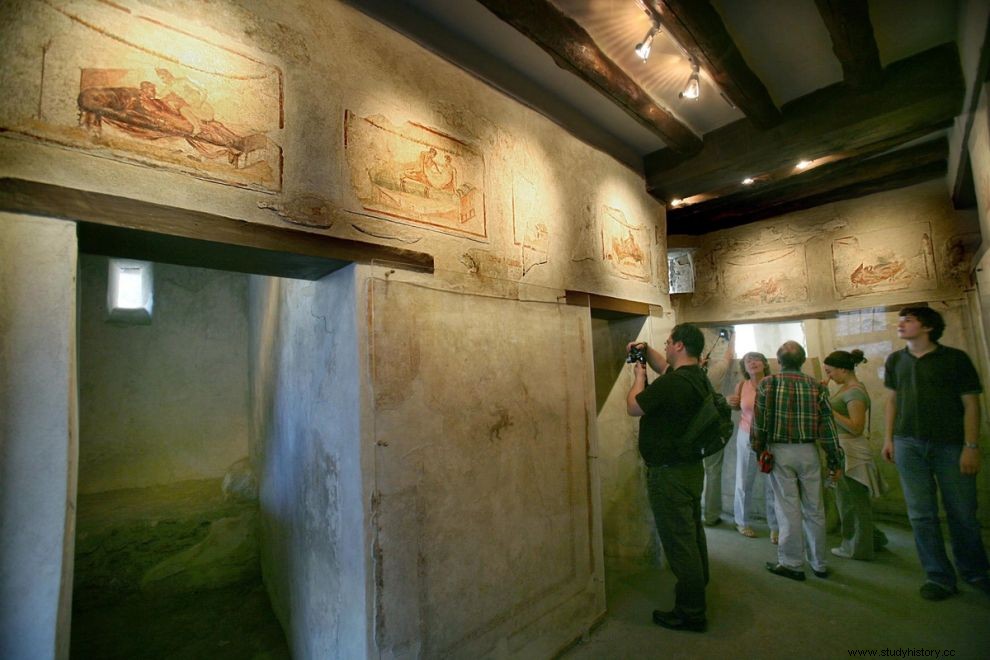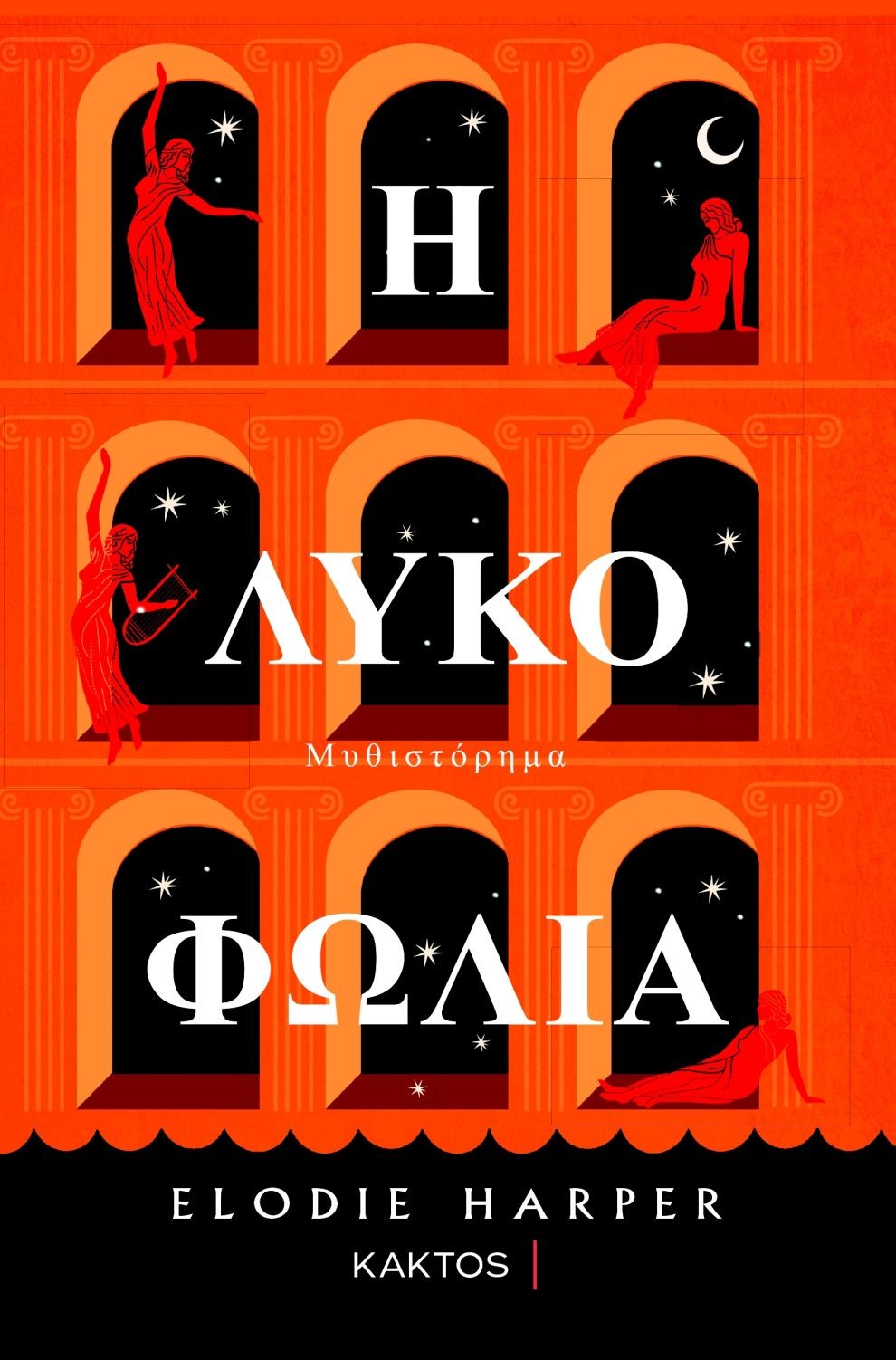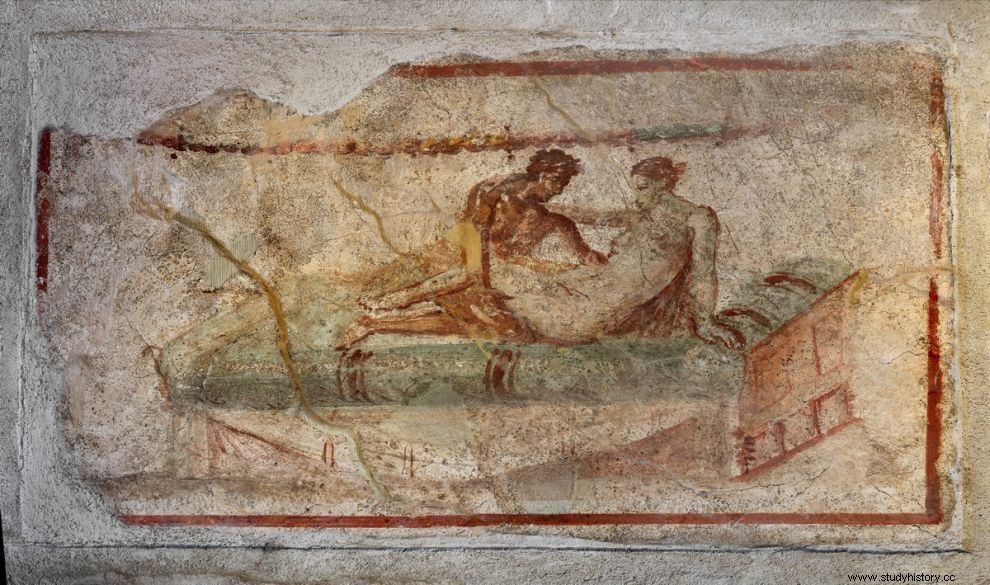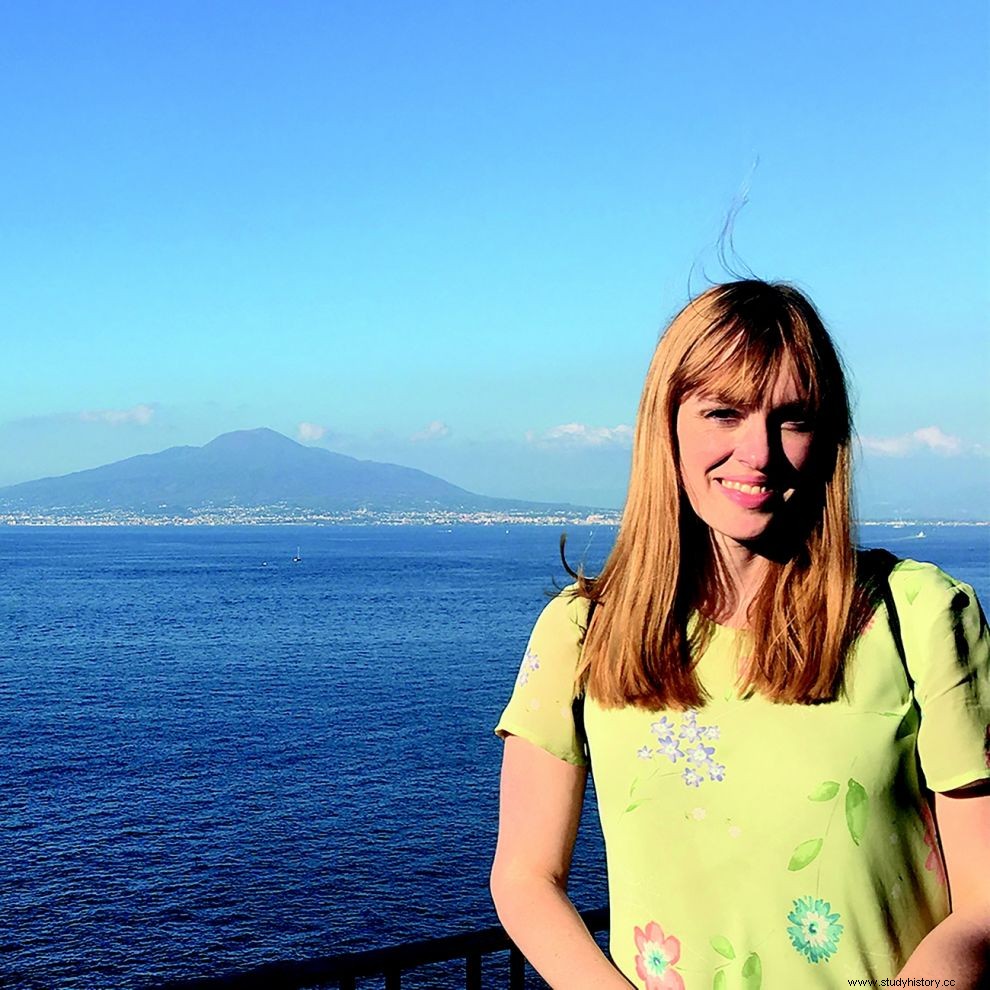In Latin the word Lupa had two meanings. The wolf, literally, but also figuratively the whore. Thus, the "wolverine dens" of ancient Rome were the workplace of prostituted women. "Pompeii's lair" is one of the best-known and best-preserved buildings of the ruined city.
Most of the women here were slaves from the Greek area or the East. The building has two floors. The master and slave houses were on the upper floor. On the ground floor there are five rooms with built-in beds, which were separated from each other by curtains. The price for sex was just a large glass of wine.
Murals of love affairs on the walls of the central corridor informed customers of Lupanar's "services provided". These frescoes today provide important information on the basis of which we can imagine the reality of the time.
Pompeii, the city that suddenly stopped living in 79 AD, was after all the city of luxury, sensuality and pleasure. In its streets, it is estimated that it hosted a total of 25 small and larger brothels, with the restored two-story Lupanar Grande standing out and gathering a large number of visitors. The "house" is located on the only street in the city that is not straight, for reasons of "discretion" for customers.
Most of the women who worked there were slaves, few were poor, marginalized, unable to survive otherwise, yet all were forced to suffer the violence of their men, owners and clients. Among other things, in addition to sexual satisfaction, they also shouldered the psychological stimulation of their customers, while there were not a few times when they acquired intimate relationships with some of the "patrons". They even left messages for their elite clients on the walls of the brothel.

Set in the famous ancient brothel "Lupanar", the novel "The Wolf Hunt" sheds light on the daily life of a class of women whose role in ancient society remained ignored for centuries. The book is published by KAKTOS Publications.
Author Elodie Harper spoke to Magazine of NEWS 24/7 about women's solidarity and its eternal fight against oppression, which flourishes in the dark rooms of Lupanar, which at times functioned as a place of amorous desires, at other times as a place of abuse, but also as a bar and meeting point of prominent men of the time. In the background, shadowy protagonists, were the women who were searching for their strength, uniting their dreams, their pursuits, but also their lost lives.
Myth and reality, fantasy and history, intertwine here, giving the reader a work that brings Elodie Harper down different and charming literary paths, somewhat further away from her previous detective novels.
What made you write this story and why did you choose this time period and specifically Pompeii?
This Pompeian brothel is iconic for tourism in the area with its erotic frescoes, and yet so little - even today - is known about the women who worked there.
What I wanted to portray was what their daily lives would be like, not focusing on the sexwork but focusing on the hopes, expectations, dreams of what they would be and how they saw themselves. Pompeii is such a wonderful place to "set" a historical novel there, because so many finds have been preserved, there is little to invent! The paths and roads, the marble counters in the taverns, the amazing frescoes and mosaics. It is such a colorful, evocative location.
What fascinated you about the history of Pompeii? What are its peculiarities?
Vesuvius you know, didn't decide what was "worth" preserving when it erupted, and so this site is unique in capturing so many different aspects of everyday life for ordinary people, some of which aren't very glamorous. We can see this even in recent archaeological discoveries in Pompeii, such as the so-called "slave room". Also, here we have the only surviving brothel of the ancient world, the lupanar, which served as the starting point for the "Wolf's Lair".

You picked the names of the protagonists from the graffiti, right? What do these women symbolize?
Veronica, Crissa and Victoria are all real women who worked at the brothel, according to its murals. The name "beautiful Paris" (probably a male sex worker) probably corresponds to a domestic worker, while the name Felix may correspond to a client or worker. Victoria left some interesting notes where she describes herself as a "conqueror", something I carry over into my novel. There are also some drawings, a face, a bird, a ship, which must be the creations of the women in their recesses. I found this very moving. The heroines of my story echo my attempt to imagine and capture the innermost thoughts of the real women who worked at Lupanar.
What elements of your central protagonist do you see in a modern woman?
Amara is "good" based on the choices presented to her. She is called upon to make very difficult decisions given the limitations of her life. I think we all have to do this, although luckily, most of us face easier situations! In the ancient world there was no feminism, so I was very careful about rendering modern sensibilities about women's equality. However, the enslaved people at that time wanted the best for themselves, they wanted justice and freedom. We have ample historical evidence for their claims. These are timeless emotions that permeate men and women, so I created a protagonist, Amara, who is determined to survive by any means necessary and conquer a better life.

What was the role of women in the society of the time, in Pompeii?
It did not have a great role in relation to today, however it was not the worst in relation to the ancient world. A woman's primary role in ancient Rome was to be a wife and mother, under the authority of the male "father family", however there is evidence that women had other roles in ancient Pompeii. For example, some have been successful in the business industry, like Julia Felix, a woman featured in the second book of my trilogy!
Wealthy women and priestesses participated in festivities in Pompeian civic buildings, suggesting that they played a role in the political and commercial life of the city, even if they could not vote or stand for office. In the lower rungs of the social ladder, things were different. Enslaved women faced enormous hardships, they had no authority over their bodies and lives. The Romans also had a huge prejudice against older women, which I tried to capture through Fabia.
What messages do you want to convey through your book? Timelessness, in women's struggle and solidarity is one of them?
Clearly this is a central message that I wanted to convey! At the same time, I believe that historically we tend to silence the reality experienced by enslaved people and especially women in ancient times, and I wanted here to make a representation of what their own perspective could be like. Most of the surviving texts from this era were written by the elite, by male authors, so I believe that the truth of the people who are not represented in these texts is particularly important.

What made you change your writing style in this job?
When you read ancient Roman texts (by Marcus Valerius Martialis or Gaius Valerius Catullus), as well as when you look at the graffiti of Pompeii, you feel that you are in front of something very fresh, modern but also close to the vernacular of the time. I also wanted to write in this style in this project. Because for the people who lived at that time, this recording is not a historical record, but their daily life.
How has your job as a journalist helped you in your writing?
As a journalist, working in the UK, I am legally bound to try to remain impartial, to represent all views fairly - and of course to be accurate! Having to evaluate in this work many different points of view without judgment gives you a "way" to deal with life, and this element has helped me a lot as a novelist. As a journalist I'm also always looking for a new angle, a story that hasn't been told before, which is what I tried to do with Lykofolia.
Who would you say are your favorite authors?
This is actually a very difficult question. Alexander Solzhenitsyn, Tsimamanda Ngozi Adichie and Charlotte Bronte are definitely among my favorites. I do enjoy reading books about the ancient world though. Last year I really enjoyed "Ariadne" by Jennifer Saint and "Great Goddesses" by Nikita Gill.
Finally, if you could change one thing about the way women are treated in modern times, what would it be?
This is a big issue! Certainly how women are treated today can differ depending on where a woman was born, depending on her social status, racial background, etc. However, I believe that a universal issue is the role of women as mothers, the lack of respect and support for mothers, the lack of high-quality government assistance for child rearing, and the perception that child care at home is purely a woman's affair, and more or less a woman's value. So I believe that if the upbringing of the child and its care were shared more between a woman and a man, this would be a good start for changing the conditions. And it would benefit the men and the children themselves too, greatly!
